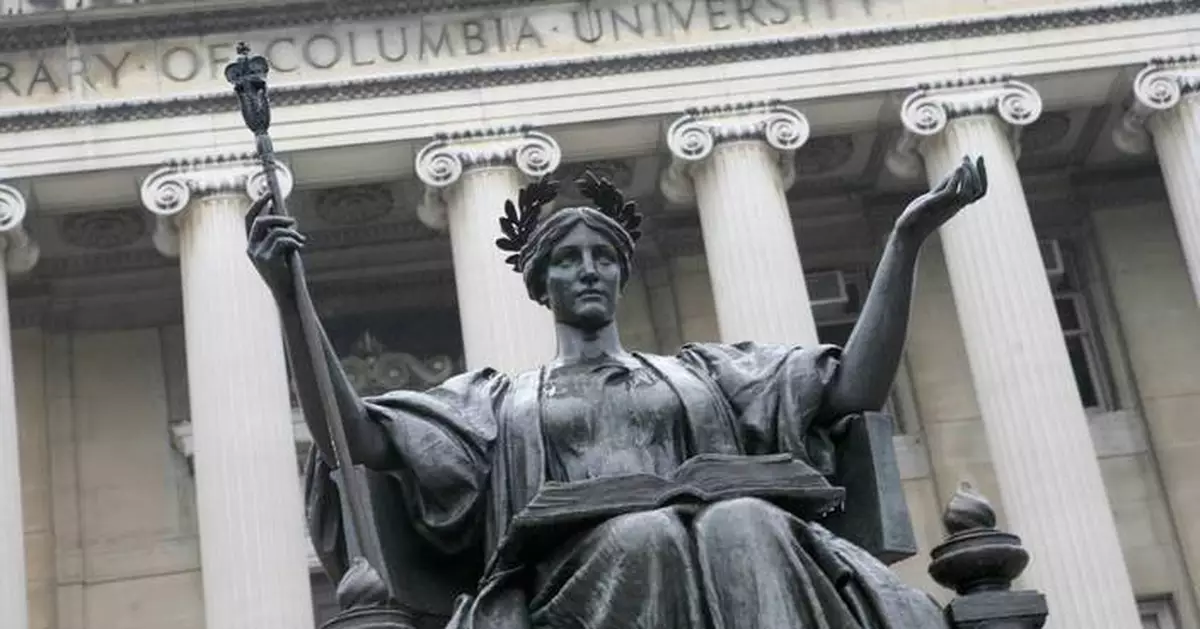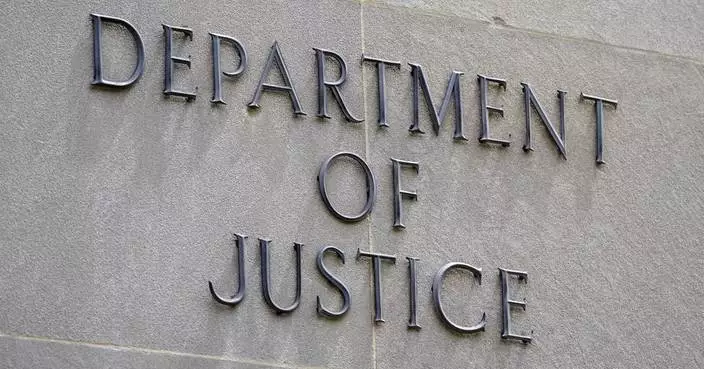WASHINGTON, D.C. (AP) — Columbia University’s president took a firm stance against antisemitism in a congressional hearing on Wednesday, but she faced bruising criticism from Republicans who say her actions haven’t supported her words, especially when it comes to disciplining faculty and students accused of bias.
Nemat Shafik's visit to Capitol Hill was a reprise of a December hearing that led to the resignations of presidents at Harvard and the University of Pennsylvania. It's part of a Republican campaign to investigate antisemitism at America's most prestigious universities since Hamas' Oct. 7 attack on Israel.
Click to Gallery
WASHINGTON, D.C. (AP) — Columbia University’s president took a firm stance against antisemitism in a congressional hearing on Wednesday, but she faced bruising criticism from Republicans who say her actions haven’t supported her words, especially when it comes to disciplining faculty and students accused of bias.
President of Columbia University Nemat Shafik testifies before the House Committee on Education and the Workforce hearing on "Columbia in Crisis: Columbia University's Response to Antisemitism" on Capitol Hill in Washington, Wednesday, April 17, 2024. (AP Photo/Jose Luis Magana)
Republican Conference Chair Rep. Elise Stefanik, R-N.Y., questions Columbia University president Nemat Shafik during the House Committee on Education and the Workforce hearing on "Columbia in Crisis: Columbia University's Response to Antisemitism" on Capitol Hill in Washington, Wednesday, April 17, 2024. (AP Photo/Jose Luis Magana)
Claire Shipman, Board of Trustees co-chair of Columbia University testifies before the House Committee on Education and the Workforce hearing on "Columbia in Crisis: Columbia University's Response to Antisemitism" on Capitol Hill in Washington, Wednesday, April 17, 2024. (AP Photo/Jose Luis Magana)
President of Columbia University Nemat Shafik testifies before the House Committee on Education and the Workforce hearing on "Columbia in Crisis: Columbia University's Response to Antisemitism" on Capitol Hill in Washington, Wednesday, April 17, 2024. (AP Photo/Jose Luis Magana)
President of Columbia University Nemat Shafik testifies before the House Committee on Education and the Workforce hearing on "Columbia in Crisis: Columbia University's Response to Antisemitism" on Capitol Hill in Washington, Wednesday, April 17, 2024. (AP Photo/Jose Luis Magana)
David Greenwald, Board of Trustees Co-Chair, Columbia University, testifies before the House Committee on Education and the Workforce hearing on "Columbia in Crisis: Columbia University's Response to Antisemitism" on Capitol Hill in Washington, Wednesday, April 17, 2024. (AP Photo/Jose Luis Magana)
Columbia President Nemat Shafik testifies before the House Committee on Education and the Workforce hearing on "Columbia in Crisis: Columbia University's Response to Antisemitism" on Capitol Hill in Washington, Wednesday, April 17, 2024. (AP Photo/Jose Luis Magana)
Professor David Schizer, Dean Emeritus and Harvey R. Miller Professor of Law & Economics, Columbia Law School, testifies before the House Committee on Education and the Workforce hearing on "Columbia in Crisis: Columbia University's Response to Antisemitism" on Capitol Hill in Washington, Wednesday, April 17, 2024. (AP Photo/Jose Luis Magana)
Columbia University president Nemat Shafik testifies before the House Committee on Education and the Workforce hearing on "Columbia in Crisis: Columbia University's Response to Antisemitism" on Capitol Hill in Washington, Wednesday, April 17, 2024. (AP Photo/Jose Luis Magana)
Republican Conference Chair Rep. Elise Stefanik, R-N.Y., questions Columbia University president Nemat Shafik during the House Committee on Education and the Workforce hearing on "Columbia in Crisis: Columbia University's Response to Antisemitism" on Capitol Hill in Washington, Wednesday, April 17, 2024. (AP Photo/Jose Luis Magana)
President of Columbia University Nemat Shafik testifies before the House Committee on Education and the Workforce hearing on "Columbia in Crisis: Columbia University's Response to Antisemitism" on Capitol Hill in Washington, Wednesday, April 17, 2024. (AP Photo/Mariam Zuhaib)
President of Columbia University Nemat Shafik testifies before the House Committee on Education and the Workforce hearing on "Columbia in Crisis: Columbia University's Response to Antisemitism" on Capitol Hill in Washington, Wednesday, April 17, 2024. (AP Photo/Jose Luis Magana)
FILE - The statue of Alma Mater on the campus of Columbia University in New York, Oct. 10, 2007. Four months after a contentious congressional hearing led to the resignations of two Ivy League presidents, Columbia University’s president is set to appear before the same committee over questions of antisemitism and the school’s response to escalating conflicts on campus. Nemat Shafik, Columbia’s president, was originally asked to testify at the House Education and Workforce Committee’s hearing in December, but she declined, citing scheduling conflicts. (AP Photo/Diane Bondareff, File)
After the other Ivy League presidents’ equivocation led to weeks of backlash, Shafik focused her message on fighting antisemitism rather than protecting free speech.
“Antisemitism has no place on our campus, and I am personally committed to doing everything I can to confront it directly,” Shafik said in her opening comments.
On key questions, she took a more decisive stance than her Ivy League colleagues, who gave lawyerly answers when asked if calls for the genocide of Jews would violate campus policies. Asked the same question, Shafik and three other Columbia leaders responded definitively: yes.
But Shafik hedged on whether certain phrases invoked by some supporters of the Palestinians rise to harassment.
Rep. Lisa McClain, a Republican from Michigan, asked her if phrases such as “ from the river to the sea, Palestine will be free ” or “long live intifada” are antisemitic.
“I hear them as such, some people don't,” Shafik said.
McClain posed the same question to David Schizer, who leads an antisemitism task force at Columbia. He said those phrases are antisemitic.
It was a shaky moment for an Ivy League president who otherwise dodged the gotcha questions that turned the previous hearing into a frenzy for Republicans, who cast elite schools as hotbeds of hatred toward Jews.
Unlike in December, much of the questioning on Wednesday focused on Columbia's handling of faculty who are accused of antisemitism. Given the protections offered by university tenure, disciplining faculty is a thorny question for universities whose professors are weighing in on the Israel-Hamas war.
Shafik was hammered on the issue by Rep. Elise Stefanik, a New York Republican and a driving force behind the hearings.
Stefanik asked about Mohamed Abdou, a visiting Arab studies professor who expressed support for Hamas on social media after Oct. 7. Shafik said she shared Stefanik's “repugnance” over Abdou’s comments, adding that he had been terminated.
“He is grading his students’ papers and will never teach at Columbia again,” she said.
“Mr. Abdou is not grading papers right now,” Stefanik later countered. She said she heard Abdou attended a pro-Palestinian demonstration at Columbia Wednesday morning, in apparent violation of the school’s new rules limiting protests to certain hours and locations.
Shafik was also grilled over Columbia's handling of Joseph Massad, a professor of modern Arab politics, accused of calling the Oct. 7 attacks “awesome,” “astonishing,” “astounding” and “incredible.”
Shafik said Massad had been reprimanded and removed as chair of an academic review committee. When Stefanik revealed that a Columbia website still listed Massad as the committee chair, she demanded Shafik's commitment to remove him from the post.
“I think that would be — I think I would — yes,” Shafik said.
Massad is a tenured professor, which generally brings added protection against firing, including for expressing controversial opinions. When asked if Massad could lose his job, Shafik wouldn't give a clear answer.
“There are some very complex issues around tenure,” she said.
In a comment to the Associated Press, Massad denied being reprimanded. He said members of Congress distorted his comments, and he disputed praising the killing of 1,200 Jews. Massad said he was not removed as chair of the academic review committee and that his term ends in the coming weeks.
Columbia professor Marcel Agüeros, a leader at the college's chapter of the American Association of University presidents, expressed dismay at how much Shafik conceded to Republicans on faculty discipline.
“The university has processes, and those processes are intended to protect academic freedom,” he said. “Faculty whose speech is not necessarily what I would say myself, they have a right to that speech.”
Complaints of antisemitism and Islamophobia have been on the rise at the New York campus of 35,000 students, prompting the school to adopt new limits on demonstrations. Protests can be held only on weekdays at certain times and locations, with advance notice to school officials.
Some civil rights groups, students and faculty say the policy curbs free expression. But Shafik cited it as evidence that the school is serious about protecting students, saying 15 students have been suspended and six are on probation for breaches.
"I promise you, from the messages I’m hearing from students, they are getting the message that violations will have consequences,” she said.
Her vision clashes with one presented by Republicans in Congress and some Jewish students who say antisemitism goes unchecked at Columbia, citing a Jewish student who was beaten on campus while putting up posters of Israeli hostages, and protesters who chanted phrases that some consider a call for the genocide of Jews.
“The problem is, action on campus doesn’t match your rhetoric today,” said Rep. Aaron Bean, a Florida Republican. “Your students, their message is quite different. Their message is one of fear.”
Some Columbia students who support Palestinians were frustrated they were not allowed into the hearing.
“This is not an honest conversation that we are having today in this committee,” said Rep. Ilhan Omar, a Democrat from Minnesota who is Muslim, after speaking with the students.
The December hearing featured the Harvard and Penn presidents, as well as the leader of the Massachusetts Institute of Technology. During heated questioning, Stefanik asked them whether “calling for the genocide of Jews” would violate each university’s code of conduct.
Liz Magill, then-president of Penn, and Claudine Gay, then-president of Harvard, both said it would depend on the situation. MIT president Sally Kornbluth said she had not heard of anyone calling for the genocide of Jews on campus, and that speech “targeted at individuals, not making public statements,” would be considered harassment.
Almost immediately, the careful responses from the university presidents drew criticism from donors, alumni and politicians. Magill resigned soon after the hearing and Gay stepped down in January following accusations of plagiarism.
Binkley reported from Los Angeles
The Associated Press’ education coverage receives financial support from multiple private foundations. AP is solely responsible for all content. Find AP’s standards for working with philanthropies, a list of supporters and funded coverage areas at AP.org.
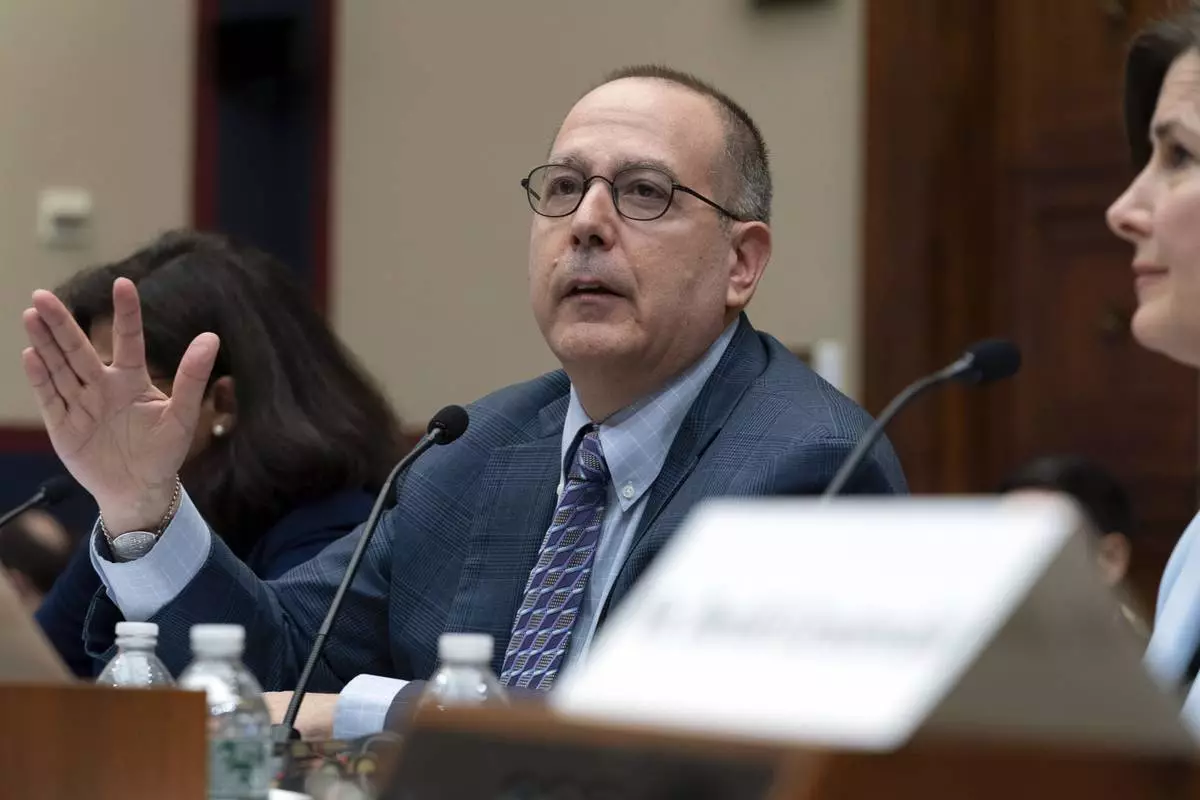
Professor David Schizer, Dean Emeritus and Harvey R. Miller Professor of Law & Economics, Columbia Law School, testifies before the House Committee on Education and the Workforce hearing on "Columbia in Crisis: Columbia University's Response to Antisemitism" on Capitol Hill in Washington, Wednesday, April 17, 2024. (AP Photo/Jose Luis Magana)
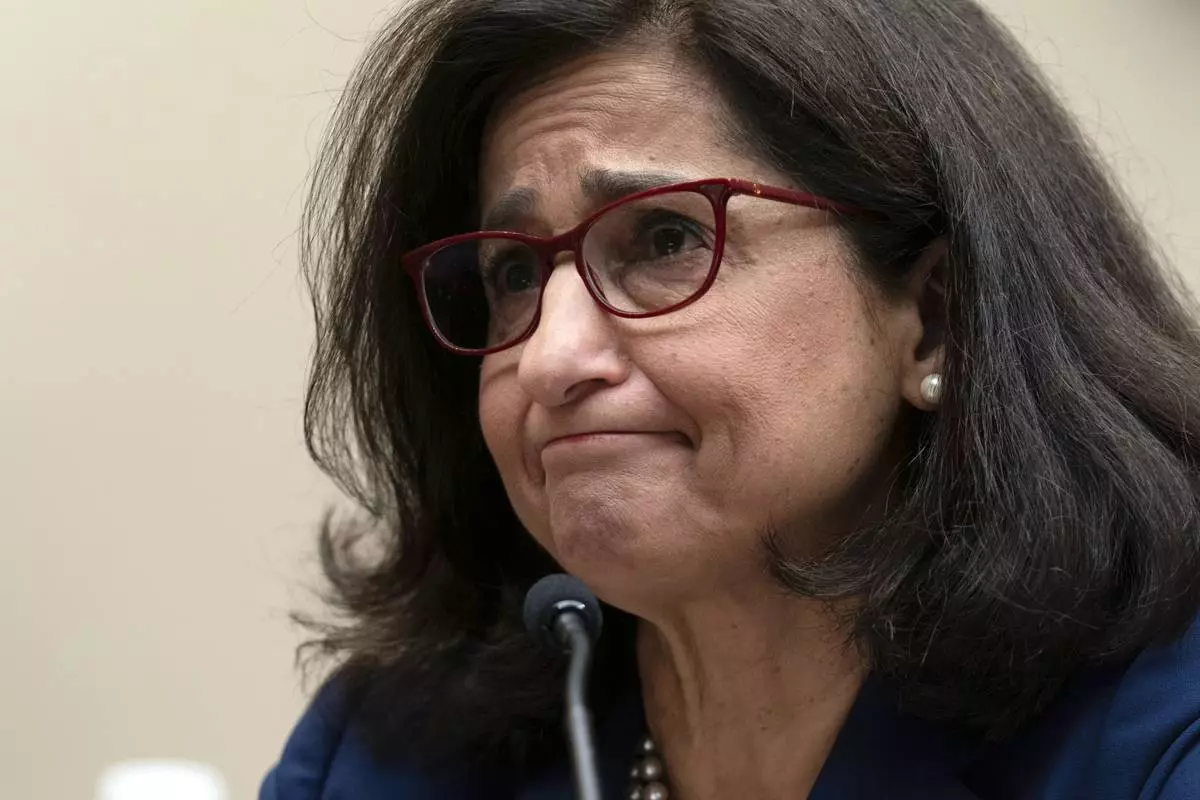
President of Columbia University Nemat Shafik testifies before the House Committee on Education and the Workforce hearing on "Columbia in Crisis: Columbia University's Response to Antisemitism" on Capitol Hill in Washington, Wednesday, April 17, 2024. (AP Photo/Jose Luis Magana)
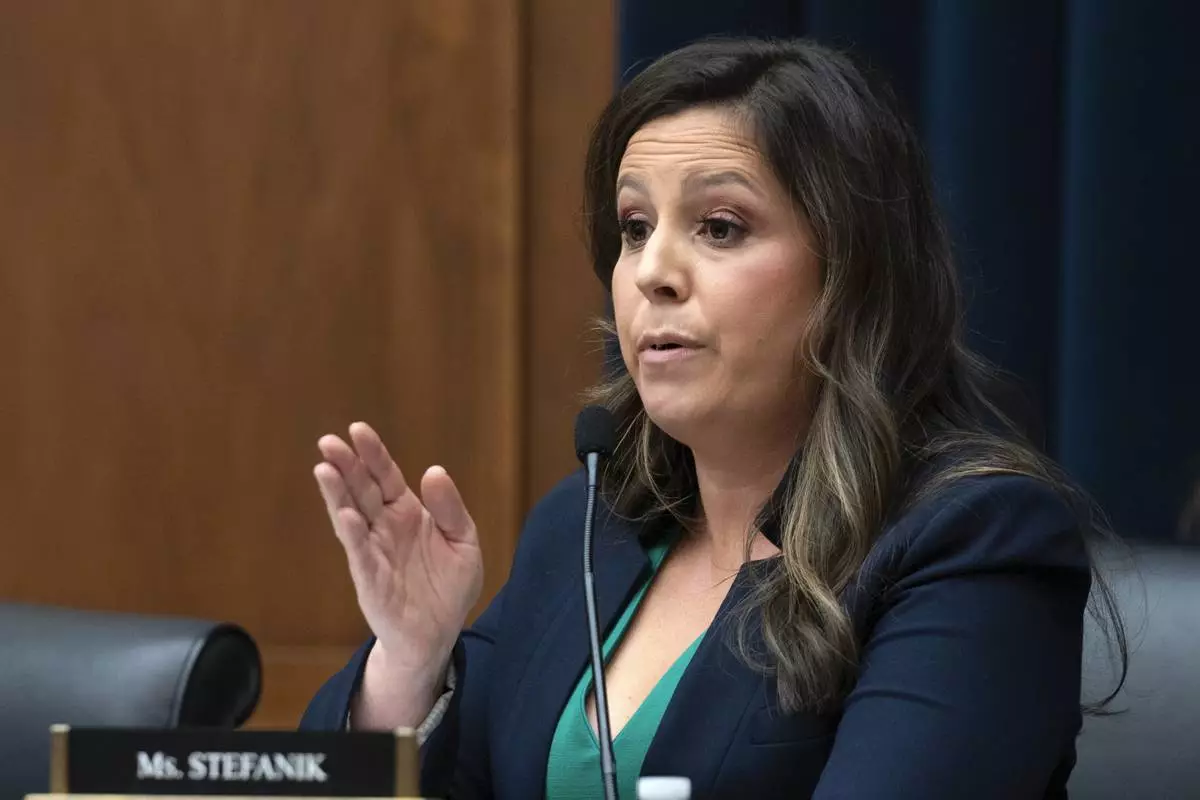
Republican Conference Chair Rep. Elise Stefanik, R-N.Y., questions Columbia University president Nemat Shafik during the House Committee on Education and the Workforce hearing on "Columbia in Crisis: Columbia University's Response to Antisemitism" on Capitol Hill in Washington, Wednesday, April 17, 2024. (AP Photo/Jose Luis Magana)
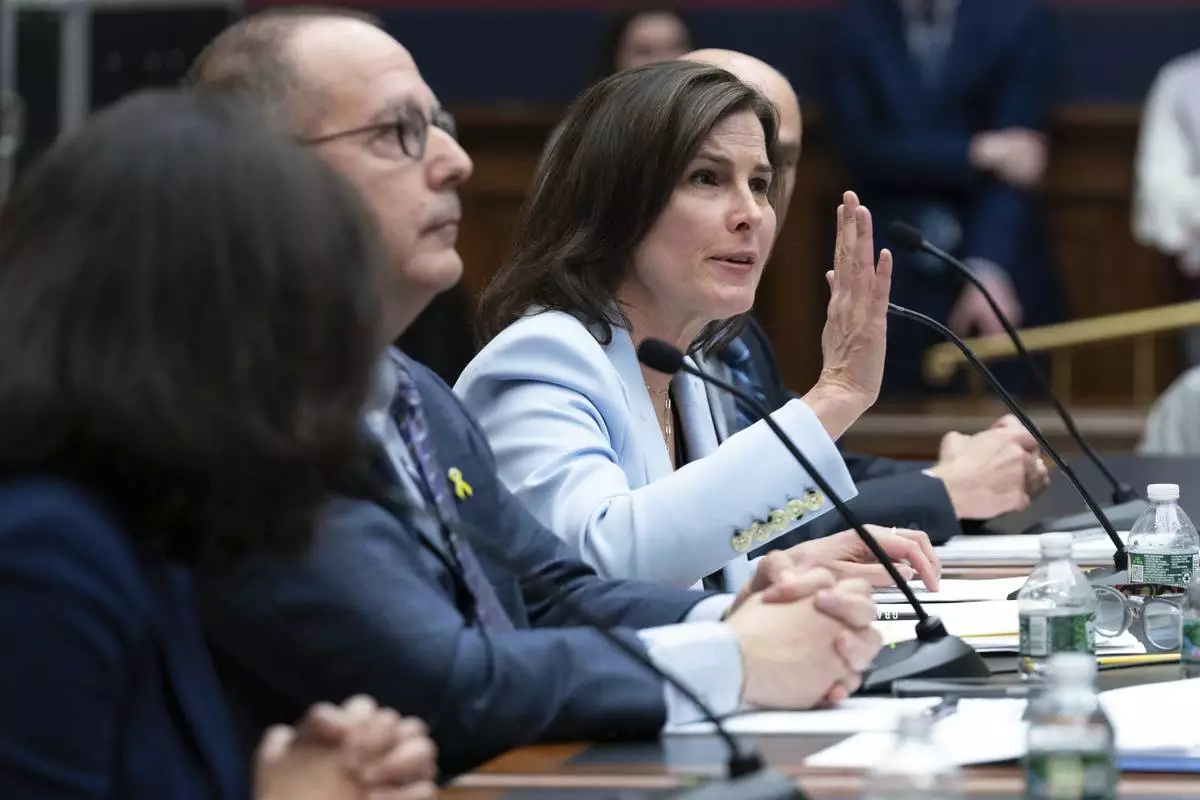
Claire Shipman, Board of Trustees co-chair of Columbia University testifies before the House Committee on Education and the Workforce hearing on "Columbia in Crisis: Columbia University's Response to Antisemitism" on Capitol Hill in Washington, Wednesday, April 17, 2024. (AP Photo/Jose Luis Magana)
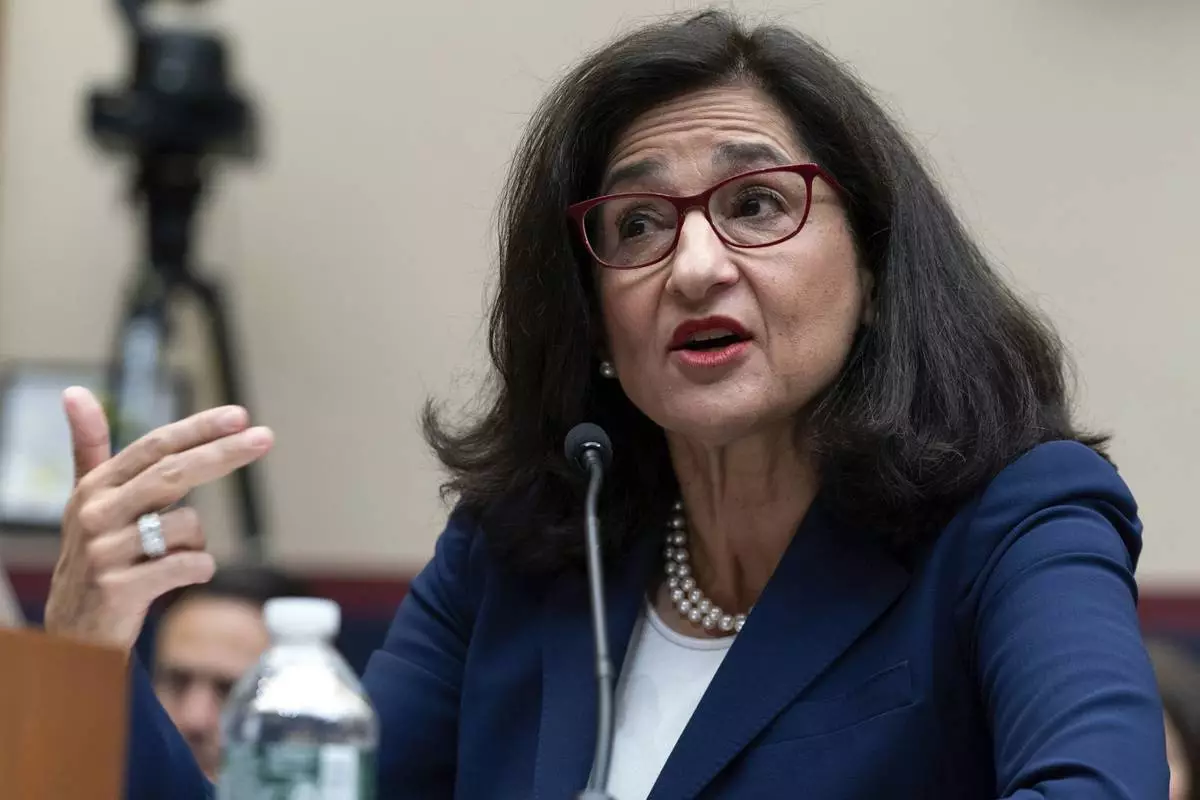
President of Columbia University Nemat Shafik testifies before the House Committee on Education and the Workforce hearing on "Columbia in Crisis: Columbia University's Response to Antisemitism" on Capitol Hill in Washington, Wednesday, April 17, 2024. (AP Photo/Jose Luis Magana)
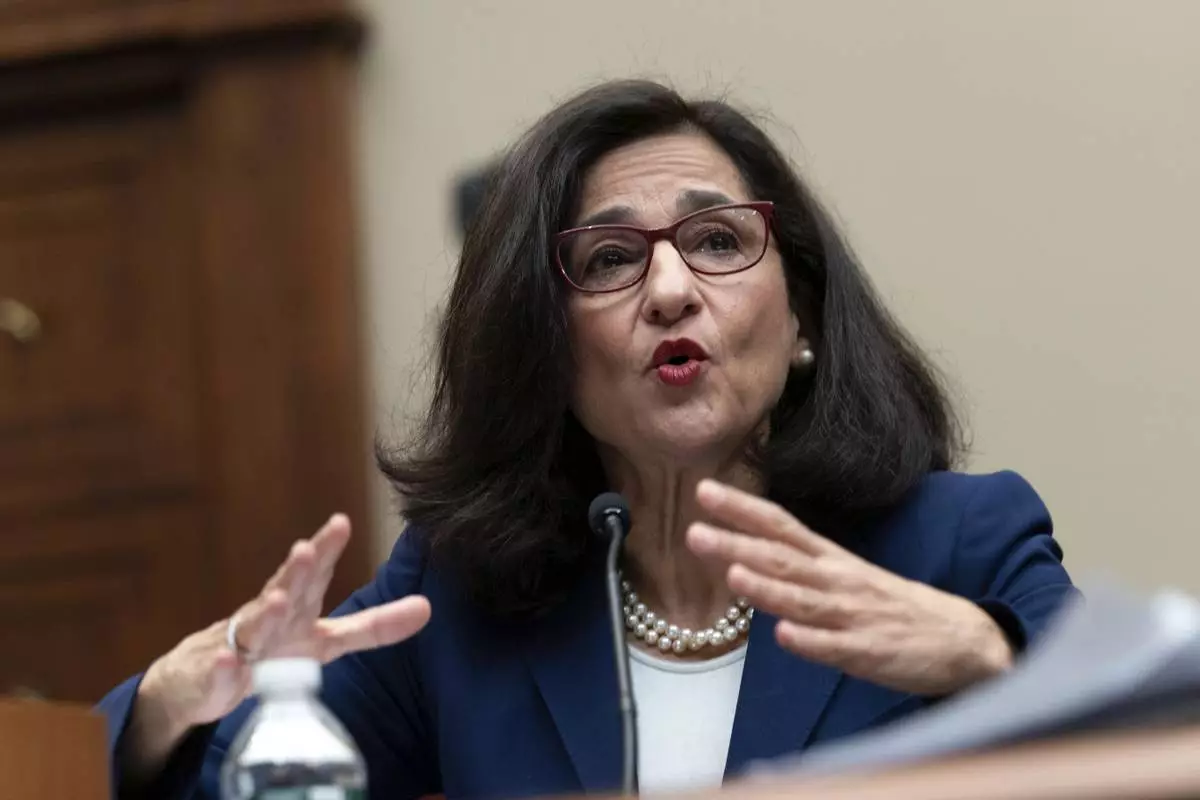
President of Columbia University Nemat Shafik testifies before the House Committee on Education and the Workforce hearing on "Columbia in Crisis: Columbia University's Response to Antisemitism" on Capitol Hill in Washington, Wednesday, April 17, 2024. (AP Photo/Jose Luis Magana)
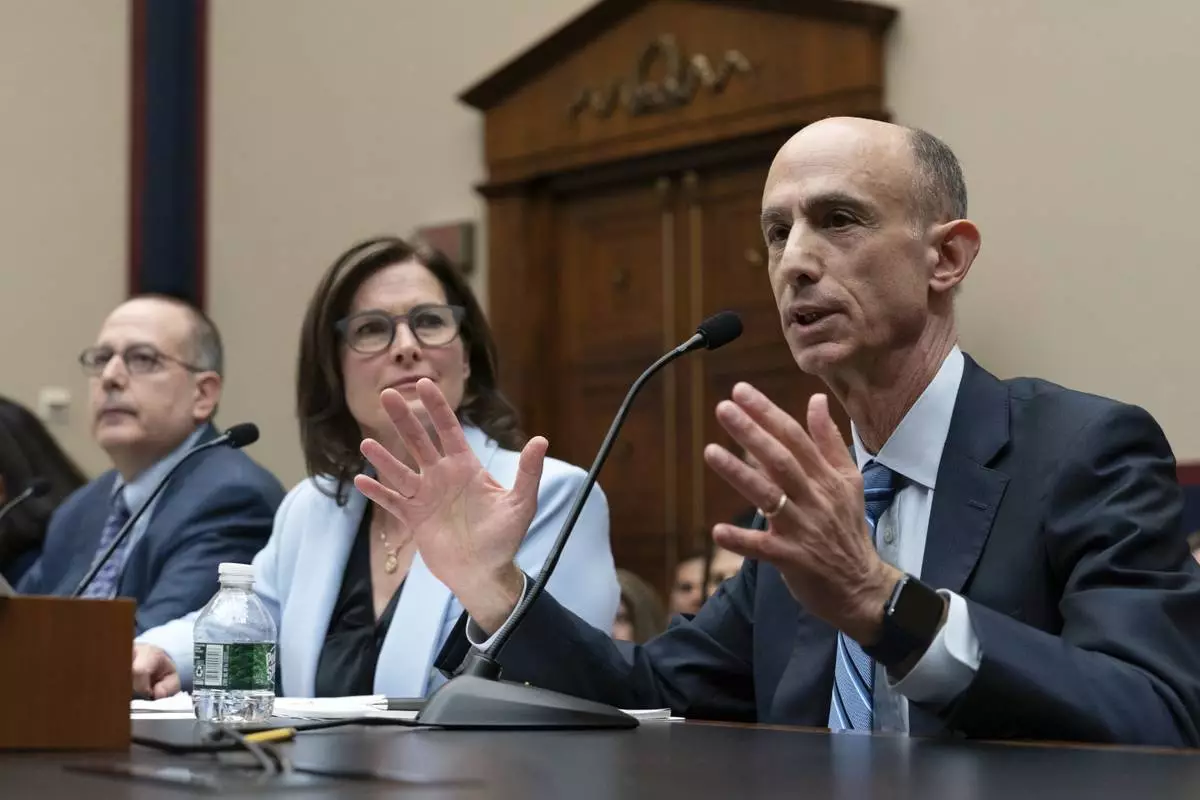
David Greenwald, Board of Trustees Co-Chair, Columbia University, testifies before the House Committee on Education and the Workforce hearing on "Columbia in Crisis: Columbia University's Response to Antisemitism" on Capitol Hill in Washington, Wednesday, April 17, 2024. (AP Photo/Jose Luis Magana)
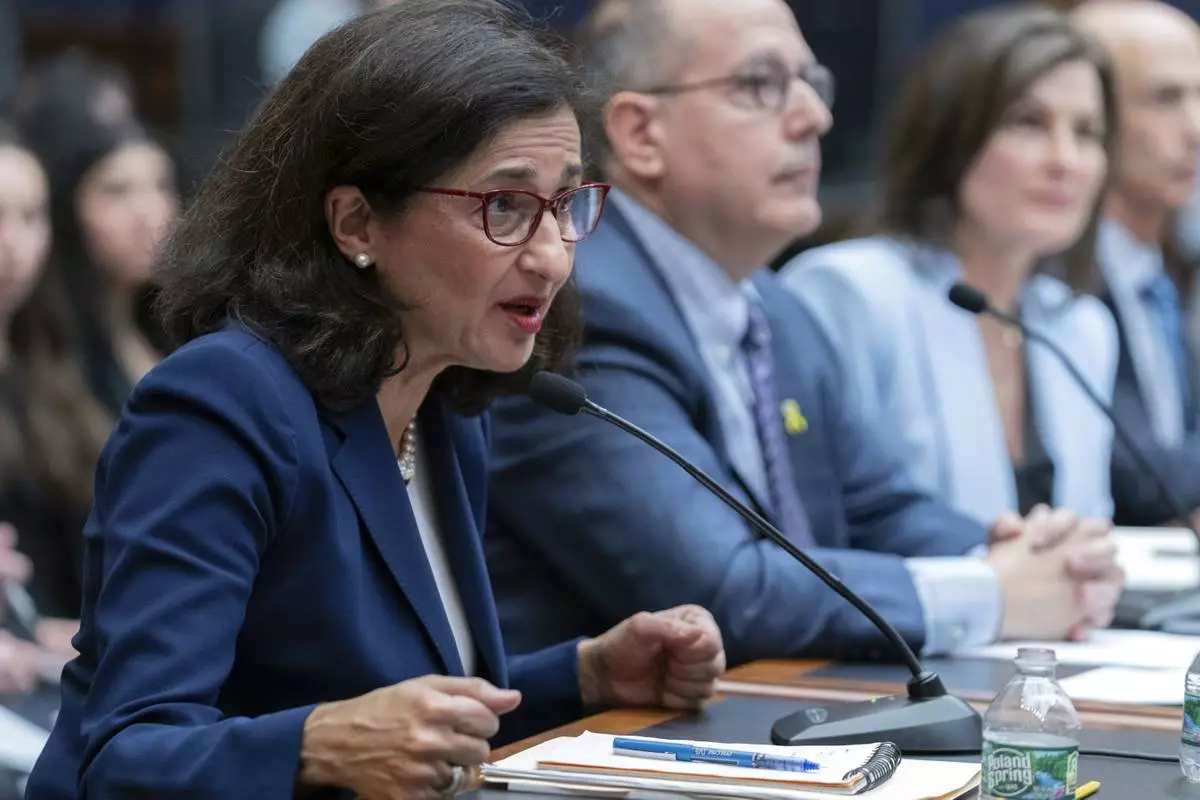
Columbia President Nemat Shafik testifies before the House Committee on Education and the Workforce hearing on "Columbia in Crisis: Columbia University's Response to Antisemitism" on Capitol Hill in Washington, Wednesday, April 17, 2024. (AP Photo/Jose Luis Magana)
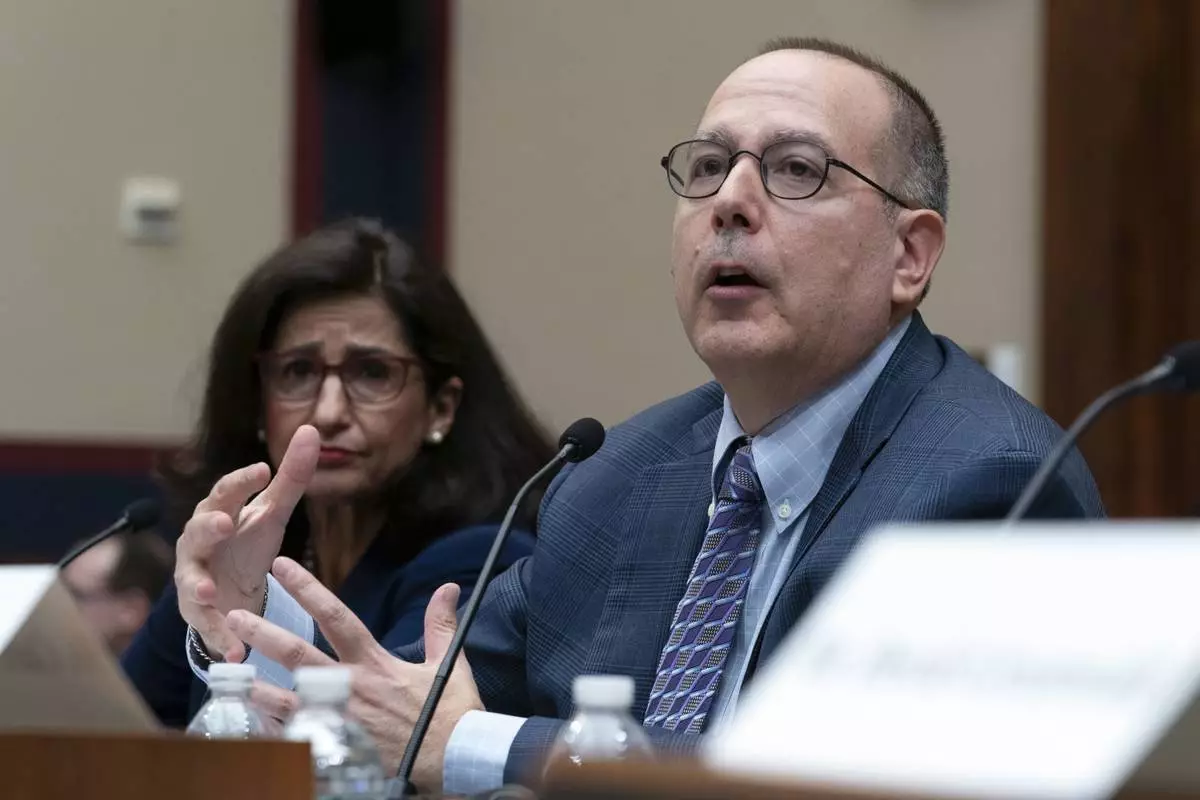
Professor David Schizer, Dean Emeritus and Harvey R. Miller Professor of Law & Economics, Columbia Law School, testifies before the House Committee on Education and the Workforce hearing on "Columbia in Crisis: Columbia University's Response to Antisemitism" on Capitol Hill in Washington, Wednesday, April 17, 2024. (AP Photo/Jose Luis Magana)
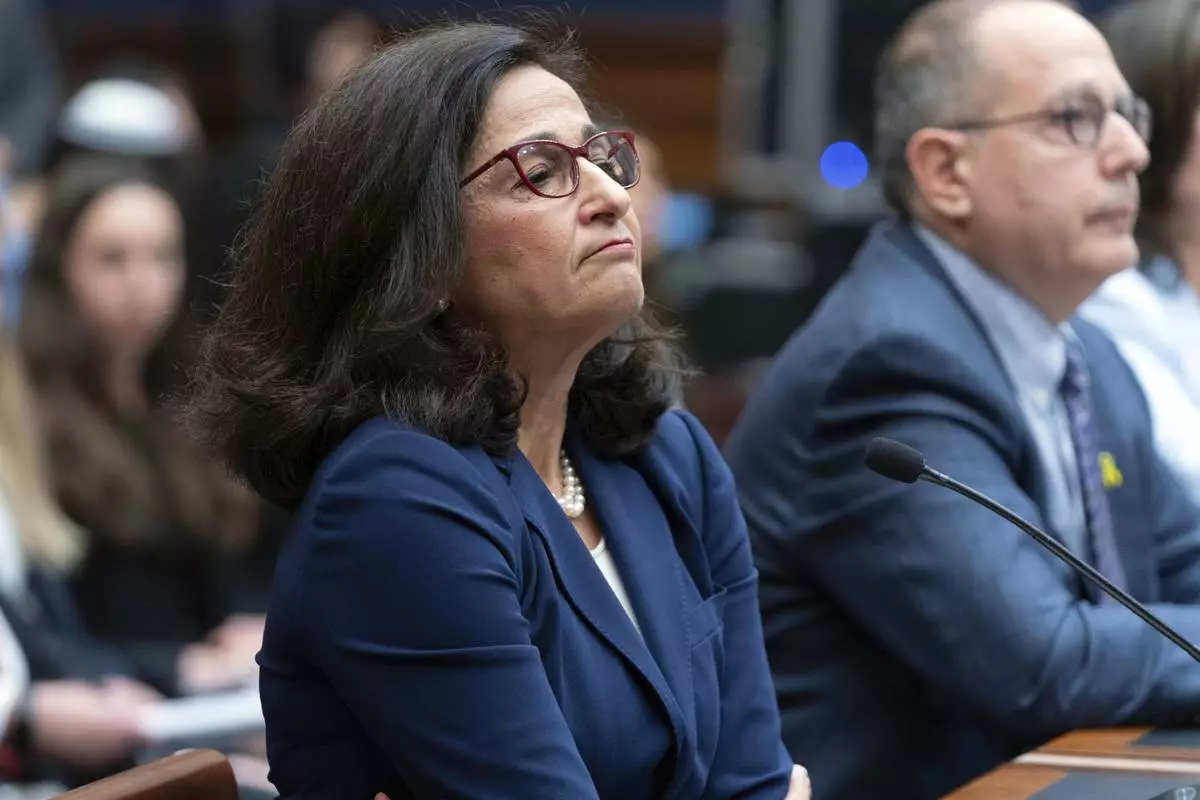
Columbia University president Nemat Shafik testifies before the House Committee on Education and the Workforce hearing on "Columbia in Crisis: Columbia University's Response to Antisemitism" on Capitol Hill in Washington, Wednesday, April 17, 2024. (AP Photo/Jose Luis Magana)
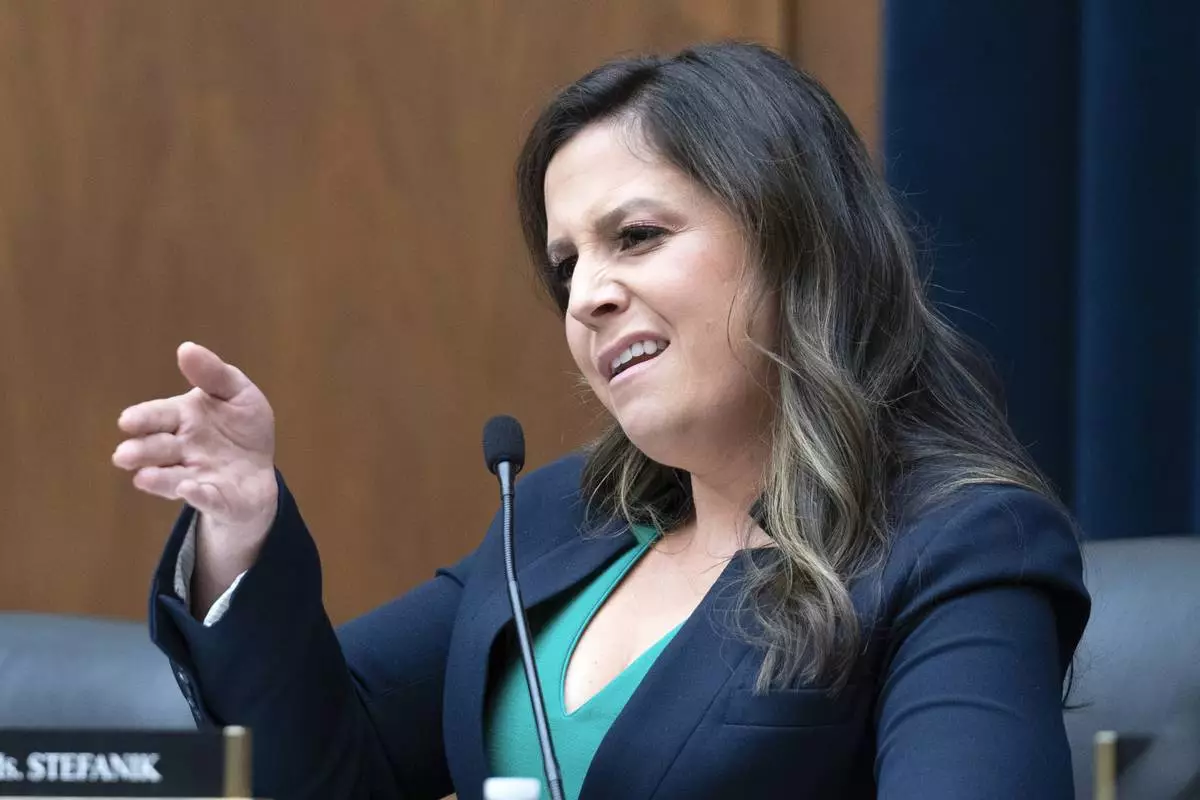
Republican Conference Chair Rep. Elise Stefanik, R-N.Y., questions Columbia University president Nemat Shafik during the House Committee on Education and the Workforce hearing on "Columbia in Crisis: Columbia University's Response to Antisemitism" on Capitol Hill in Washington, Wednesday, April 17, 2024. (AP Photo/Jose Luis Magana)
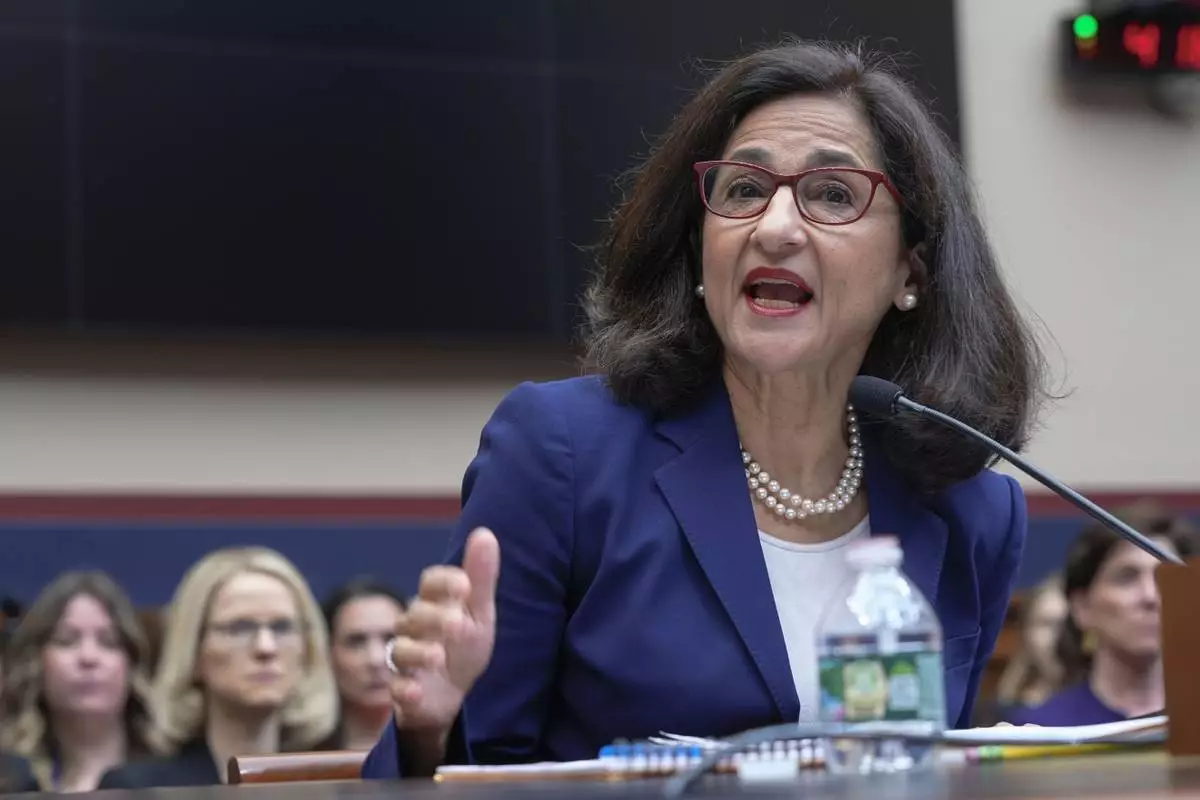
President of Columbia University Nemat Shafik testifies before the House Committee on Education and the Workforce hearing on "Columbia in Crisis: Columbia University's Response to Antisemitism" on Capitol Hill in Washington, Wednesday, April 17, 2024. (AP Photo/Mariam Zuhaib)
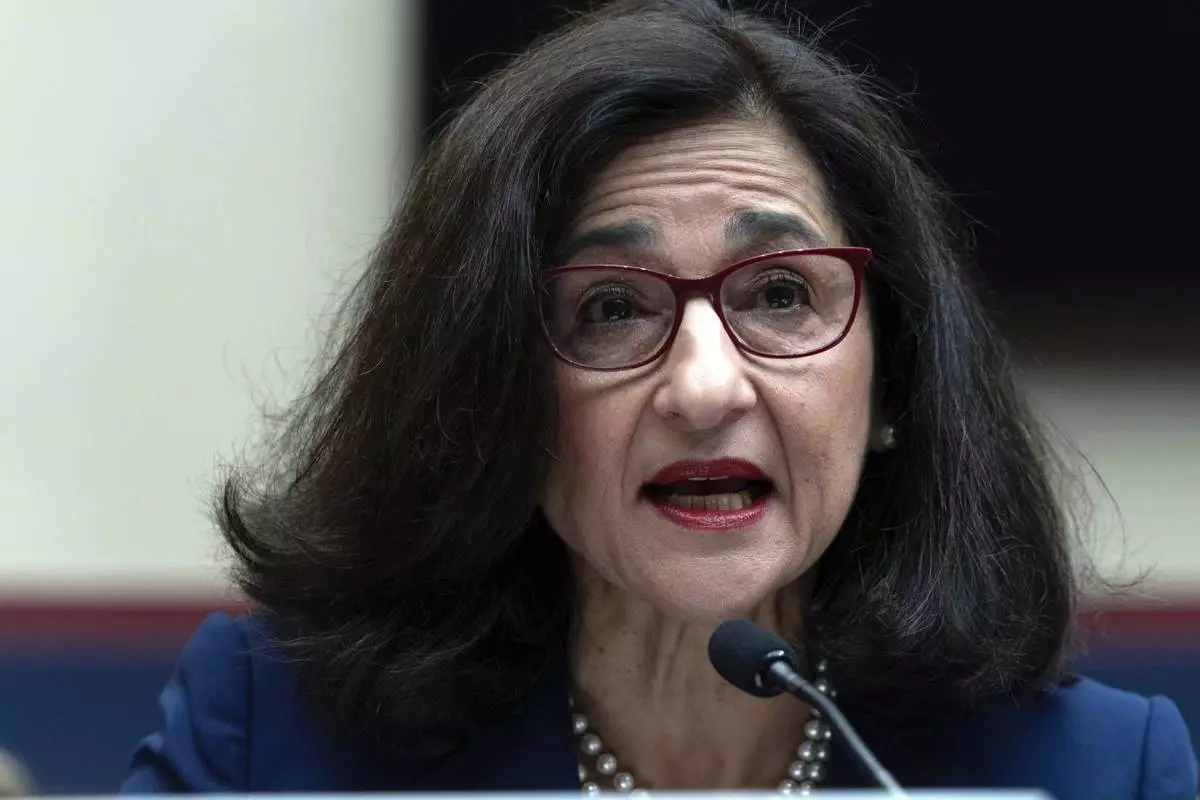
President of Columbia University Nemat Shafik testifies before the House Committee on Education and the Workforce hearing on "Columbia in Crisis: Columbia University's Response to Antisemitism" on Capitol Hill in Washington, Wednesday, April 17, 2024. (AP Photo/Jose Luis Magana)
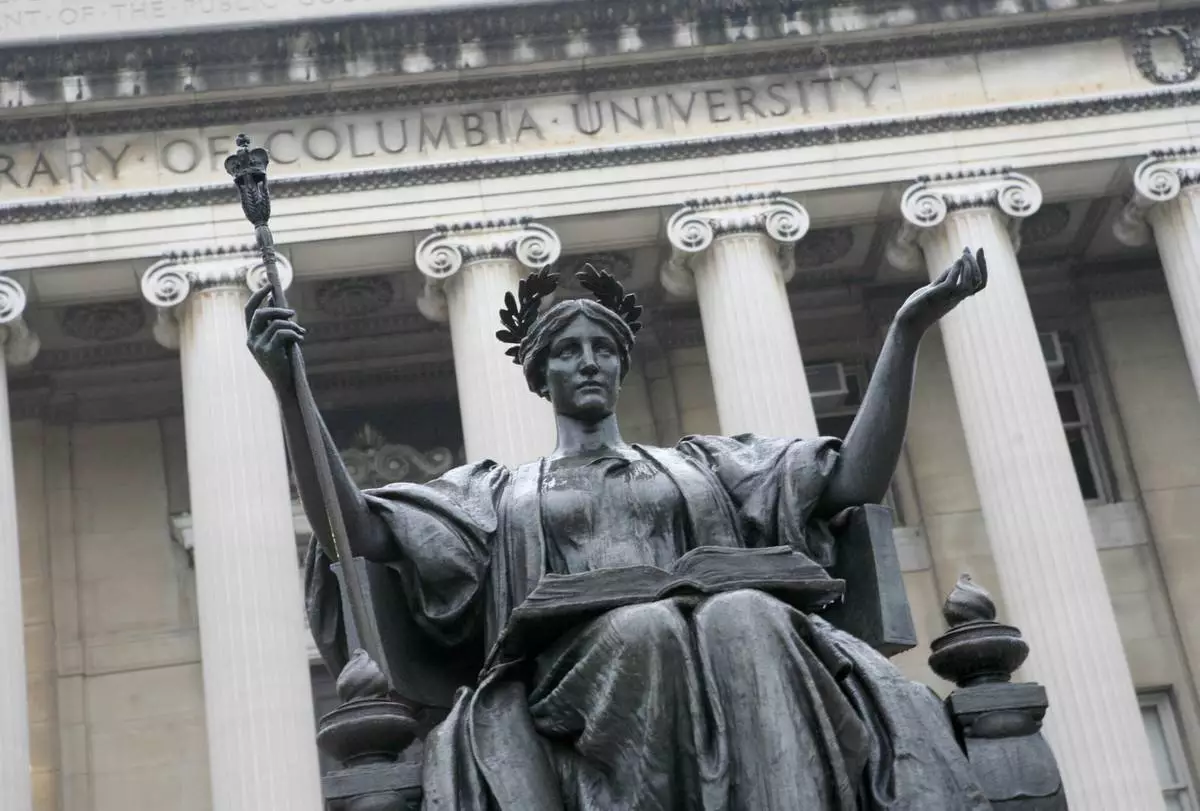
FILE - The statue of Alma Mater on the campus of Columbia University in New York, Oct. 10, 2007. Four months after a contentious congressional hearing led to the resignations of two Ivy League presidents, Columbia University’s president is set to appear before the same committee over questions of antisemitism and the school’s response to escalating conflicts on campus. Nemat Shafik, Columbia’s president, was originally asked to testify at the House Education and Workforce Committee’s hearing in December, but she declined, citing scheduling conflicts. (AP Photo/Diane Bondareff, File)
WEST PALM BEACH, Fla. (AP) — Israeli Prime Minister Benjamin Netanyahu worked to mend ties with Republican presidential candidate Donald Trump on Friday and offered measured optimism about progress toward a cease-fire deal for Gaza as he neared the end of a contentious U.S. visit that put on display the growing American divisions over support for the Israeli-Hamas war.
At Trump's Florida Mar-a-Lago estate, where the two men met face-to-face for the first time in nearly four years, Netanyahu told journalists he wanted to see U.S.-mediated talks succeed for a cease-fire and release of hostages.
“I hope so,” Netanyahu said, when reporters asked if his U.S. trip had made progress. While Netanyahu at home is increasingly accused of resisting a deal to end the 9-month-old war to stave off the potential collapse of his far-right government when it ends, he said Friday he was "certainly eager to have one. And we’re working on it.”
As president, Trump went well beyond his predecessors in fulfilling Netanyahu’s top wishes from the United States. Yet relations soured after Netanyahu became one of the first world leaders to congratulate Joe Biden for his 2020 presidential victory, which Trump continues to deny.
The two men now have a strong interest in restoring their relationship, both for the political support their alliance brings and for the luster it gives each with their conservative supporters.
A beaming Trump was waiting for Netanyahu on the stone steps outside his private club and residence in Palm Beach, Florida. He warmly clasped the hands of the Israeli leader.
“We’ve always had a great relationship,” Trump insisted before journalists. Asked as the two sat down in a muraled room for talks if Netanyahu’s trip to Mar-a-Lago was repairing their bond, Trump responded, “It was never bad.”
For both men, Friday’s meeting was aimed at highlighting for their home audiences their depiction of themselves as strong leaders who have gotten big things done on the world stage, and can again.
Netanyahu’s Florida trip followed a fiery address to a joint meeting of Congress on Wednesday that defended his government’s conduct of the war and condemned American protesters galvanized by the killing of more than 39,000 Palestinians in the conflict.
On Thursday, Netanyahu had met in Washington with Biden and Vice President Kamala Harris, who appears on track to becoming the new Democratic presidential nominee after Biden decided to step out of the race. Both pressed the Israeli leader to work quickly to wrap up a deal to bring a cease-fire and release hostages held by Hamas.
Trump’s campaign said he pledged in Friday's meeting to “make every effort to bring peace to the Middle East” and combat antisemitism on college campuses if American voters elect him to the presidency in November.
Netanyahu handed Trump a framed photo that the Israeli leader said showed a child who has been held hostage by Hamas-led militants since the first hours of the war. “We’ll get it taken care of,” Trump assured him.
In a speech later Friday before a group of young Christian conservatives, Trump said he also asked Netanyahu during their meeting how “a Jewish person, or a person that loves Israel” can vote for Democrats.
He also laced into Harris for missing Netanyahu's speech and claimed she “doesn’t like Jewish people” and “doesn’t like Israel." Harris has been married to a Jewish man for a decade.
For Trump, the meeting was a chance to be cast as an ally and statesman, as well as to sharpen efforts by Republicans to portray themselves as the party most loyal to Israel.
Divisions among Americans over U.S. support for Israel’s war against Hamas in Gaza have opened cracks in years of strong bipartisan backing for Israel, the biggest recipient of U.S. aid.
For Netanyahu, repairing relations with Trump is imperative given the prospect that Trump may once again become president of the United States, which is Israel’s vital arms supplier and protector.
One gamble for Netanyahu is whether he could get more of the terms he wants in any deal on a Gaza cease-fire and hostage release, and in his much hoped-for closing of a normalization deal with Saudi Arabia, if he waits out the Biden administration in hopes that Trump wins.
“Benjamin Netanyahu has spent much of his career in the last two decades in tethering himself to the Republican Party,” said Aaron David Miller, a former U.S. diplomat for Arab-Israeli negotiations, now a senior fellow at the Carnegie Endowment for International Peace.
For the next six months, that means “mending ties with an irascible, angry president," Miller said, meaning Trump.
Netanyahu and Trump last met at a September 2020 White House signing ceremony for the signature diplomatic achievement of both men’s political careers. It was an accord brokered by the Trump administration in which the United Arab Emirates and Bahrain agreed to establish normal diplomatic relations with Israel.
For Israel, it amounted to the two countries formally recognizing it for the first time. It was a major step in what Israel hoped would be an easing of tensions and a broadening of economic ties with its Arab neighbors.
In public postings and statements after his break with Netanyahu, Trump portrayed himself as having stuck his neck out for Israel as president, and Netanyahu paying him back with disloyalty.
He also has criticized Netanyahu on other points, faulting him as “not prepared” for the Oct. 7 Hamas attacks that started the war in Gaza, for example.
In his high-profile speech to Congress on Wednesday and again Friday at Mar-a-Lago, Netanyahu poured praise on Trump, calling the regional accords Trump helped broker historic and thanking him “for all the things he did for Israel.”
Netanyahu listed actions by the Trump administration long-sought by Israeli governments — the U.S. officially saying Israel had sovereignty over the Golan Heights, captured from Syria during a 1967 war; a tougher U.S. policy toward Iran; and Trump declaring Jerusalem the capital of Israel, breaking with longstanding U.S. policy that Jerusalem's status should be decided in Israeli-Palestinian negotiations.
“I appreciated that,” Trump told “Fox & Friends” on Thursday, referring to Netanyahu's praise.
Trump has repeatedly urged that Israel with U.S. support “finish the job” in Gaza and destroy Hamas, but he hasn’t elaborated on how.
Natalie Melzer in Tel Aviv, Israel, Adriana Gomez Licon in West Palm Beach, Florida, and Jill Colvin in New York contributed. Knickmeyer reported from Washington. Price reported from New York.
Follow the AP's coverage of the 2024 election at https://apnews.com/hub/election-2024.

Republican presidential candidate former President Donald Trump listens as he meets with Israeli Prime Minister Benjamin Netanyahu at his Mar-a-Lago estate, Friday, July 26, 2024, in Palm Beach, Fla. (AP Photo/Alex Brandon)
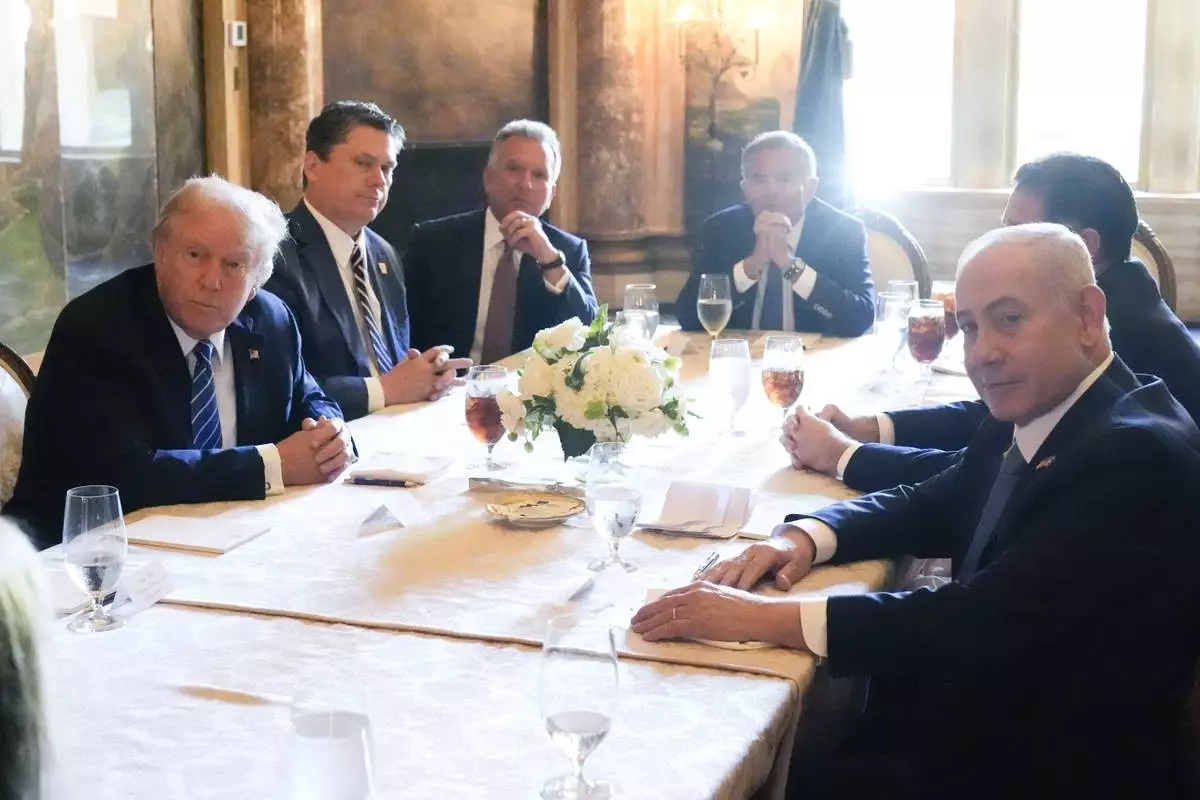
Republican presidential candidate former President Donald Trump meets with Israeli Prime Minister Benjamin Netanyahu at his Mar-a-Lago estate, Friday, July 26, 2024, in Palm Beach, Fla. (AP Photo/Alex Brandon)
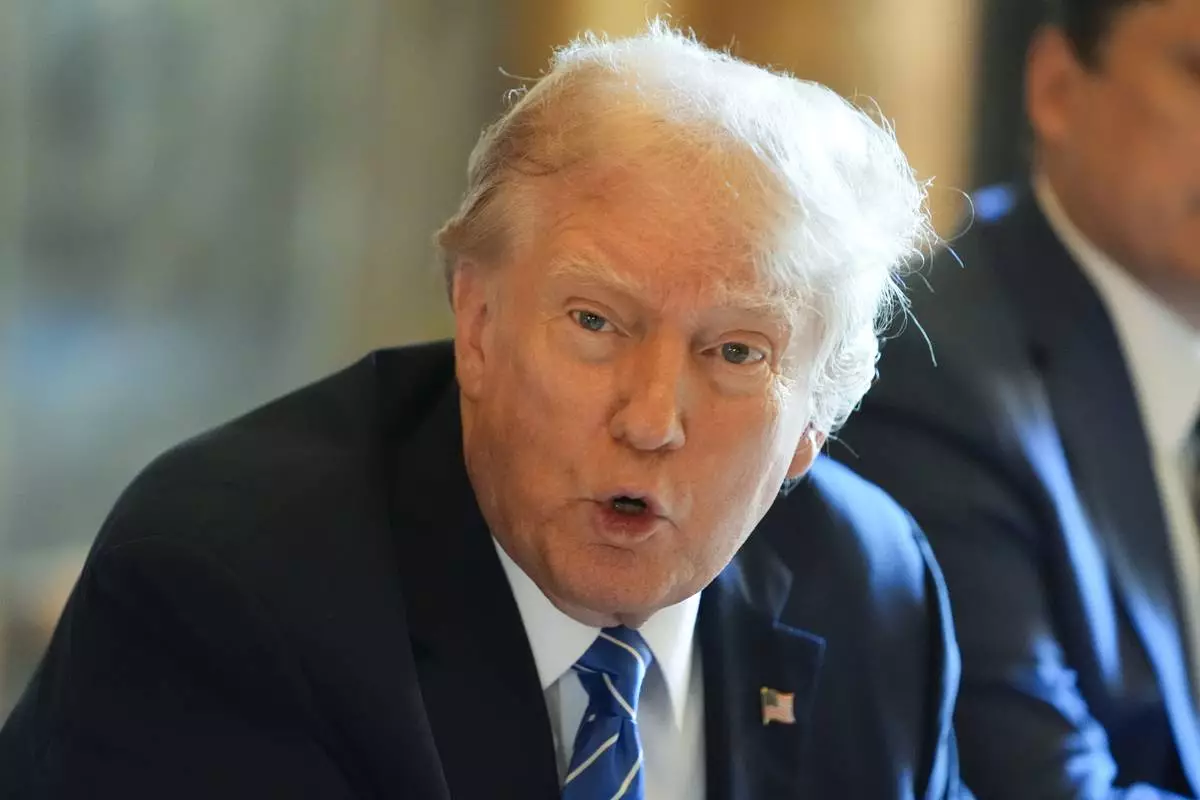
Republican presidential candidate former President Donald Trump speaks while meeting with Israeli Prime Minister Benjamin Netanyahu at his Mar-a-Lago estate, Friday, July 26, 2024, in Palm Beach, Fla. (AP Photo/Alex Brandon)
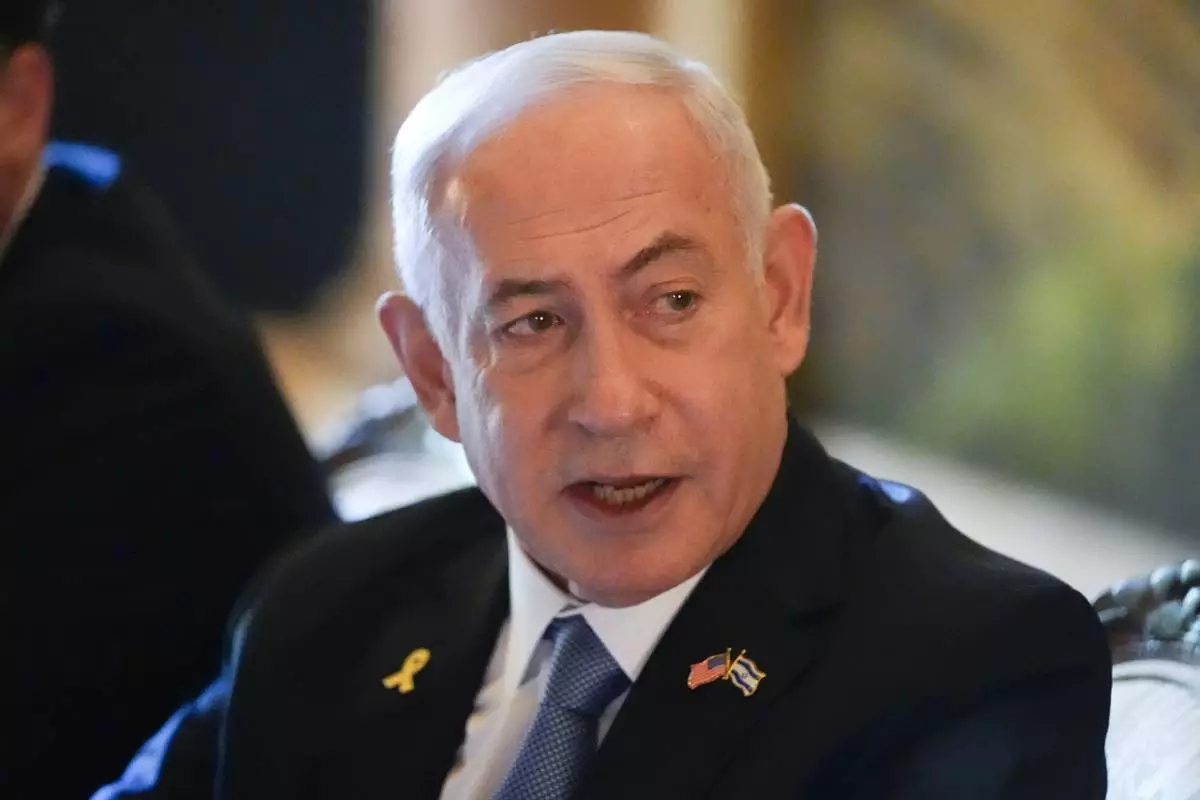
Israeli Prime Minister Benjamin Netanyahu speaks while meeting with Republican presidential candidate former President Donald Trump at his Mar-a-Lago estate, Friday, July 26, 2024, in Palm Beach, Fla. (AP Photo/Alex Brandon)
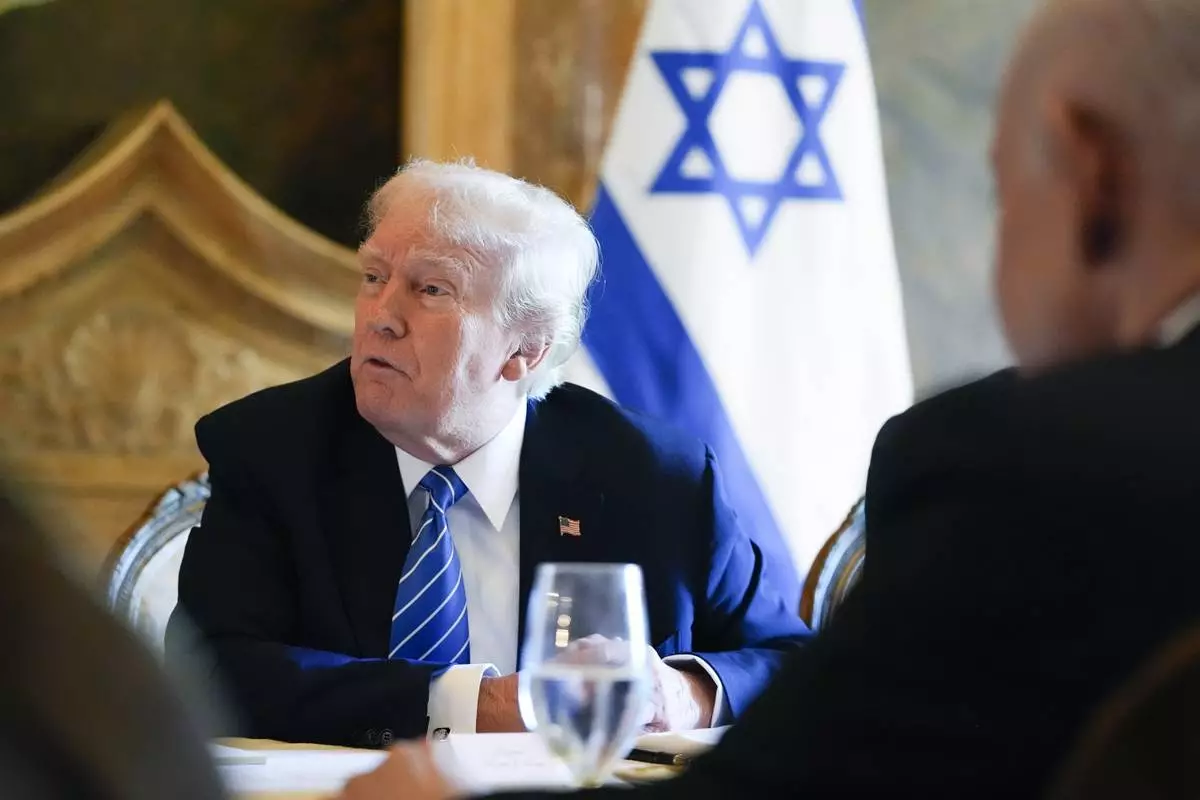
Republican presidential candidate former President Donald Trump meets with Israeli Prime Minister Benjamin Netanyahu, right, at his Mar-a-Lago estate, Friday, July 26, 2024, in Palm Beach, Fla. (AP Photo/Alex Brandon)
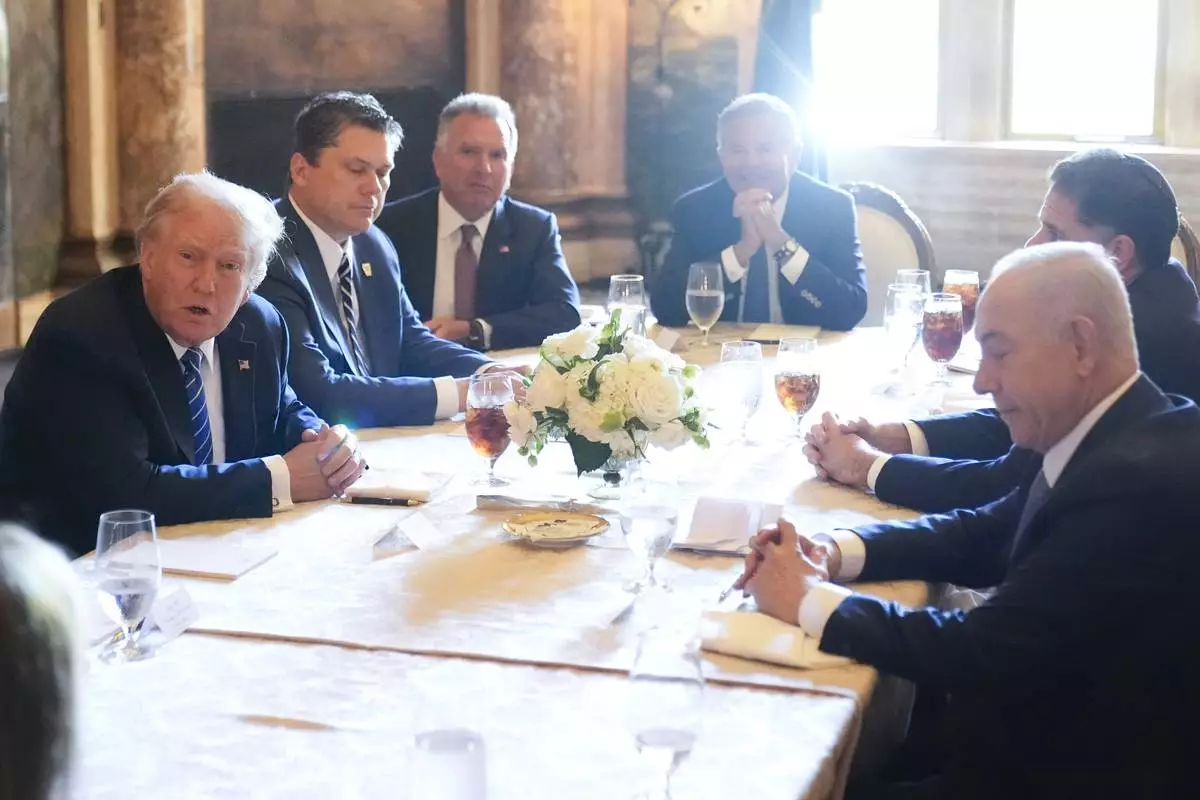
Republican presidential candidate former President Donald Trump meets with Israeli Prime Minister Benjamin Netanyahu at his Mar-a-Lago estate, Friday, July 26, 2024, in Palm Beach, Fla. (AP Photo/Alex Brandon)
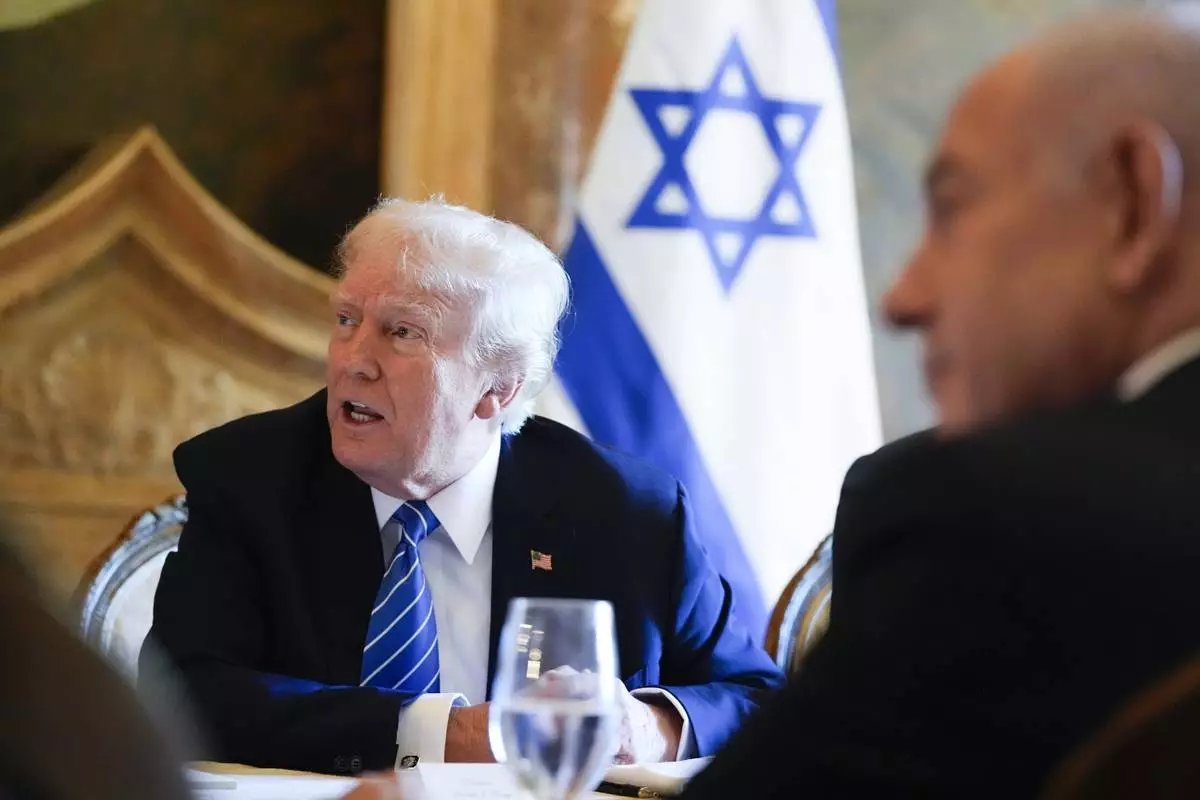
Republican presidential candidate former President Donald Trump meets with Israeli Prime Minister Benjamin Netanyahu at his Mar-a-Lago estate, Friday, July 26, 2024, in Palm Beach, Fla. (AP Photo/Alex Brandon)

FILE - President Donald Trump, right, meets with Israeli Prime Minister Benjamin Netanyahu in the Oval Office, Sept. 15, 2020, at the White House in Washington. Trump is due to talk face-to-face with Netanyahu for the first time in nearly four years. The meeting Friday, July 26, 2024, at Mar-a-Lago will mend a break that has lasted since 2021. Trump at the time blasted Netanyahu for being one of the first leaders to congratulate President Joe Biden for his election victory. (AP Photo/Alex Brandon, File)
















